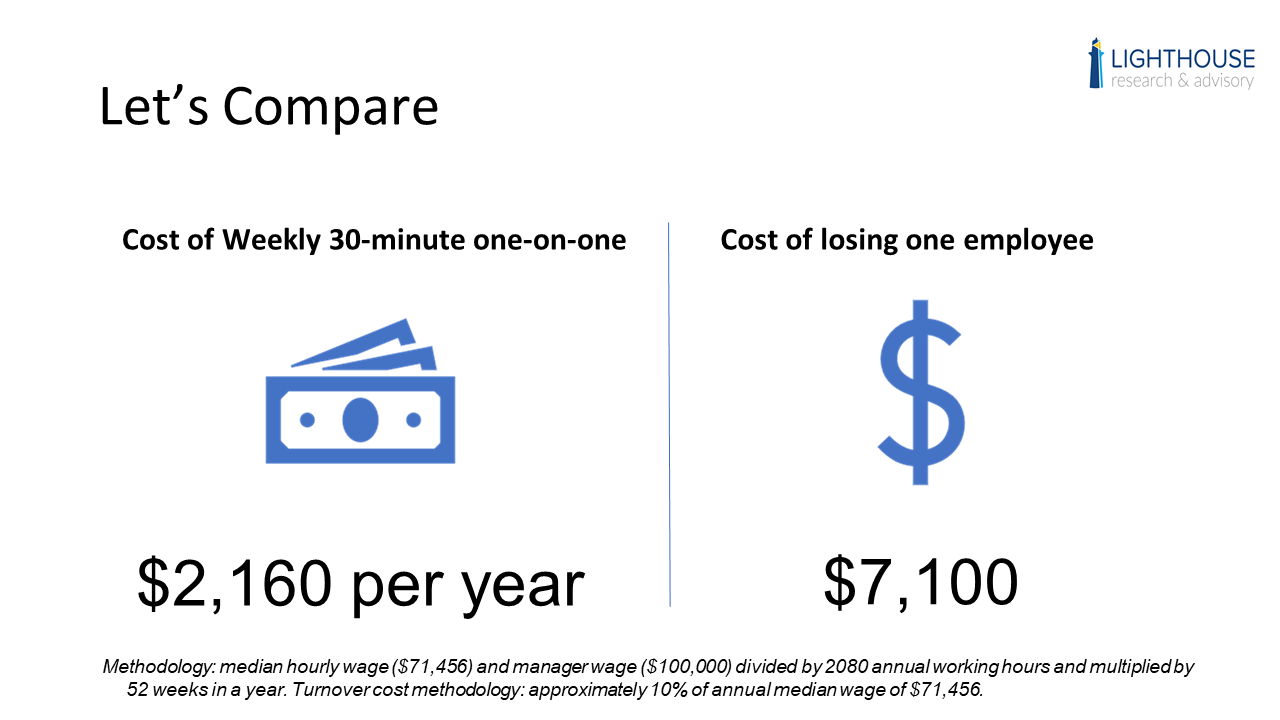In most cases, losing weight comes down to eating right and exercising. Creating great relationships means being attentive and caring of the other person’s needs.
We know many of these things, yet we struggle with doing them. In an employment context, there’s one thing that we know works, yet it’s not done nearly as often as it should: one-on-ones.
Managers often push off these meetings because they seem too busy, or because they’re not sure what the context and content should be. But that’s a mistake. The cost of losing an employee is multiple times higher than the cost of doing a regular one-on-one meeting with staff, and the data actually prove it. Check out the graphic below for a comparison:

Data: The Cost of Employee One-On-Ones
If a manager making an average salary of $100,000 meets weekly for half an hour with their employee making the median wage of $71,456, the annual cost of that is $2,160. That’s the annual cost. Yet to lose an employee can cost anywhere from $7,000 to $100,000+ depending on the actual pay of that worker.
The Benefits of Employee One-On-Ones
Employee turnover, as we’ve covered pretty extensively, isn’t always preventable. But when I see in the research that employees with a supportive manager are MUCH less likely to have plans to quit, we have to pay attention to that. When we combine that with our findings on employee support for frontline workers, there’s a real call to action:
If someone says their manager understands them, they are 6,000+% more likely to feel supported by their manager. Source
That understanding comes from time and investment in the relationship more than anything else. As our Chief Culture Officer George Rogers likes to say, “I can tell someone loves me if they spend their time with me.” That may seem “soft” for a management practice, but there are hard costs in losing your best employees unnecessarily.

Ben Eubanks is the Chief Research Officer at Lighthouse Research & Advisory. He is an author, speaker, and researcher with a passion for telling stories and making complex topics easy to understand.
His latest book Talent Scarcity answers the question every business leader has asked in recent years: “Where are all the people, and how do we get them back to work?” It shares practical and strategic recruiting and retention ideas and case studies for every employer.
His first book, Artificial Intelligence for HR, is the world’s most-cited resource on AI applications for hiring, development, and employee experience.
Ben has more than 10 years of experience both as an HR/recruiting executive as well as a researcher on workplace topics. His work is practical, relevant, and valued by practitioners from F100 firms to SMB organizations across the globe.
He has spoken to tens of thousands of HR professionals across the globe and enjoys sharing about technology, talent practices, and more. His speaking credits include the SHRM Annual Conference, Seminarium International, PeopleMatters Dubai and India, and over 100 other notable events.
